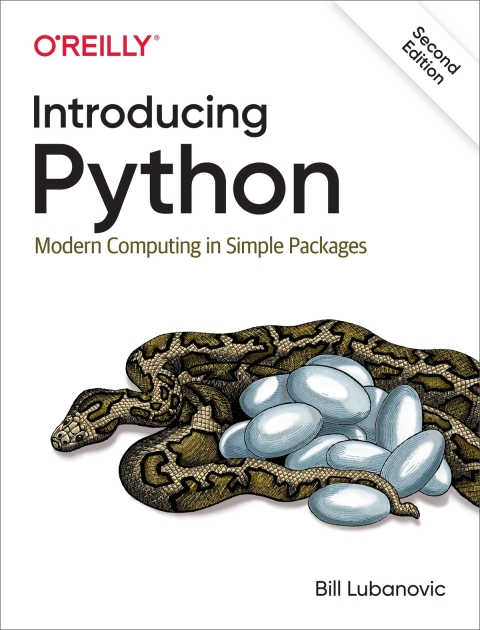Description
Efnisyfirlit
- Preface
- Audience
- Changes in the Second Edition
- Outline
- Python Versions
- Conventions Used in This Book
- Using Code Examples
- O’Reilly Online Learning
- How to Contact Us
- Acknowledgments
- I. Python Basics
- 1. A Taste of Py
- Mysteries
- Little Programs
- A Bigger Program
- Python in the Real World
- Python Versus the Language from Planet X
- Why Python?
- Why Not Python?
- Python 2 Versus Python 3
- Installing Python
- Running Python
- Using the Interactive Interpreter
- Using Python Files
- What’s Next?
- Your Moment of Zen
- Coming Up
- Things to Do
- 2. Data: Types, Values, Variables, and Names
- Python Data Are Objects
- Types
- Mutability
- Literal Values
- Variables
- Assignment
- Variables Are Names, Not Places
- Assigning to Multiple Names
- Reassigning a Name
- Copying
- Choose Good Variable Names
- Coming Up
- Things to Do
- 3. Numbers
- Booleans
- Integers
- Literal Integers
- Integer Operations
- Integers and Variables
- Precedence
- Bases
- Type Conversions
- How Big Is an int?
- Floats
- Math Functions
- Coming Up
- Things to Do
- 4. Choose with if
- Comment with #
- Continue Lines with
- Compare with if, elif, and else
- What Is True?
- Do Multiple Comparisons with in
- New: I Am the Walrus
- Coming Up
- Things to Do
- 5. Text Strings
- Create with Quotes
- Create with str()
- Escape with
- Combine by Using +
- Duplicate with *
- Get a Character with []
- Get a Substring with a Slice
- Get Length with len()
- Split with split()
- Combine by Using join()
- Substitute by Using replace()
- Strip with strip()
- Search and Select
- Case
- Alignment
- Formatting
- Old style: %
- New style: {} and format()
- Newest Style: f-strings
- More String Things
- Coming Up
- Things to Do
- 6. Loop with while and for
- Repeat with while
- Cancel with break
- Skip Ahead with continue
- Check break Use with else
- Iterate with for and in
- Cancel with break
- Skip with continue
- Check break Use with else
- Generate Number Sequences with range()
- Other Iterators
- Coming Up
- Things to Do
- 7. Tuples and Lists
- Tuples
- Create with Commas and ()
- Create with tuple()
- Combine Tuples by Using +
- Duplicate Items with *
- Compare Tuples
- Iterate with for and in
- Modify a Tuple
- Lists
- Create with []
- Create or Convert with list()
- Create from a String with split()
- Get an Item by [ offset ]
- Get Items with a Slice
- Add an Item to the End with append()
- Add an Item by Offset with insert()
- Duplicate All Items with *
- Combine Lists by Using extend() or +
- Change an Item by [ offset ]
- Change Items with a Slice
- Delete an Item by Offset with del
- Delete an Item by Value with remove()
- Get an Item by Offset and Delete It with pop()
- Delete All Items with clear()
- Find an Item’s Offset by Value with index()
- Test for a Value with in
- Count Occurrences of a Value with count()
- Convert a List to a String with join()
- Reorder Items with sort() or sorted()
- Get Length with len()
- Assign with =
- Copy with copy(), list(), or a Slice
- Copy Everything with deepcopy()
- Compare Lists
- Iterate with for and in
- Iterate Multiple Sequences with zip()
- Create a List with a Comprehension
- Lists of Lists
- Tuples Versus Lists
- There Are No Tuple Comprehensions
- Coming Up
- Things to Do
- 8. Dictionaries and Sets
- Dictionaries
- Create with {}
- Create with dict()
- Convert with dict()
- Add or Change an Item by [ key ]
- Get an Item by [key] or with get()
- Get All Keys with keys()
- Get All Values with values()
- Get All Key-Value Pairs with items()
- Get Length with len()
- Combine Dictionaries with {**a, **b}
- Combine Dictionaries with update()
- Delete an Item by Key with del
- Get an Item by Key and Delete It with pop()
- Delete All Items with clear()
- Test for a Key with in
- Assign with =
- Copy with copy()
- Copy Everything with deepcopy()
- Compare Dictionaries
- Iterate with for and in
- Dictionary Comprehensions
- Sets
- Create with set()
- Convert with set()
- Get Length with len()
- Add an Item with add()
- Delete an Item with remove()
- Iterate with for and in
- Test for a Value with in
- Combinations and Operators
- Set Comprehensions
- Create an Immutable Set with frozenset()
- Data Structures So Far
- Make Bigger Data Structures
- Coming Up
- Things to Do
- 9. Functions
- Define a Function with def
- Call a Function with Parentheses
- Arguments and Parameters
- None Is Useful
- Positional Arguments
- Keyword Arguments
- Specify Default Parameter Values
- Explode/Gather Positional Arguments with *
- Explode/Gather Keyword Arguments with **
- Keyword-Only Arguments
- Mutable and Immutable Arguments
- Docstrings
- Functions Are First-Class Citizens
- Inner Functions
- Closures
- Anonymous Functions: lambda
- Generators
- Generator Functions
- Generator Comprehensions
- Decorators
- Namespaces and Scope
- Uses of _ and __ in Names
- Recursion
- Async Functions
- Exceptions
- Handle Errors with try and except
- Make Your Own Exceptions
- Coming Up
- Things to Do
- 10. Oh Oh: Objects and Classes
- What Are Objects?
- Simple Objects
- Define a Class with class
- Attributes
- Methods
- Initialization
- Inheritance
- Inherit from a Parent Class
- Override a Method
- Add a Method
- Get Help from Your Parent with super()
- Multiple Inheritance
- Mixins
- In self Defense
- Attribute Access
- Direct Access
- Getters and Setters
- Properties for Attribute Access
- Properties for Computed Values
- Name Mangling for Privacy
- Class and Object Attributes
- Method Types
- Instance Methods
- Class Methods
- Static Methods
- Duck Typing
- Magic Methods
- Aggregation and Composition
- When to Use Objects or Something Else
- Named Tuples
- Dataclasses
- Attrs
- Coming Up
- Things to Do
- 11. Modules, Packages, and Goodies
- Modules and the import Statement
- Import a Module
- Import a Module with Another Name
- Import Only What You Want from a Module
- Packages
- The Module Search Path
- Relative and Absolute Imports
- Namespace Packages
- Modules Versus Objects
- Goodies in the Python Standard Library
- Handle Missing Keys with setdefault() and defaultdict()
- Count Items with Counter()
- Order by Key with OrderedDict()
- Stack + Queue == deque
- Iterate over Code Structures with itertools
- Print Nicely with pprint()
- Get Random
- More Batteries: Get Other Python Code
- Coming Up
- Things to Do
- II. Python in Practice
- 12. Wrangle and Mangle Data
- Text Strings: Unicode
- Python 3 Unicode Strings
- UTF-8
- Encode
- Decode
- HTML Entities
- Normalization
- For More Information
- Text Strings: Regular Expressions
- Find Exact Beginning Match with match()
- Find First Match with search()
- Find All Matches with findall()
- Split at Matches with split()
- Replace at Matches with sub()
- Patterns: Special Characters
- Patterns: Using Specifiers
- Patterns: Specifying match() Output
- Binary Data
- bytes and bytearray
- Convert Binary Data with struct
- Other Binary Data Tools
- Convert Bytes/Strings with binascii()
- Bit Operators
- A Jewelry Analogy
- Coming Up
- Things to Do
- 13. Calendars and Clocks
- Leap Year
- The datetime Module
- Using the time Module
- Read and Write Dates and Times
- All the Conversions
- Alternative Modules
- Coming Up
- Things to Do
- 14. Files and Directories
- File Input and Output
- Create or Open with open()
- Write a Text File with print()
- Write a Text File with write()
- Read a Text File with read(), readline(), or readlines()
- Write a Binary File with write()
- Read a Binary File with read()
- Close Files Automatically by Using with
- Change Position with seek()
- Memory Mapping
- File Operations
- Check Existence with exists()
- Check Type with isfile()
- Copy with copy()
- Change Name with rename()
- Link with link() or symlink()
- Change Permissions with chmod()
- Change Ownership with chown()
- Delete a File with remove()
- Directory Operations
- Create with mkdir()
- Delete with rmdir()
- List Contents with listdir()
- Change Current Directory with chdir()
- List Matching Files with glob()
- Pathnames
- Get a Pathname with abspath()
- Get a symlink Pathname with realpath()
- Build a Pathname with os.path.join()
- Use pathlib
- BytesIO and StringIO
- Coming Up
- Things to Do
- 15. Data in Time: Processes and Concurrency
- Programs and Processes
- Create a Process with subprocess
- Create a Process with multiprocessing
- Kill a Process with terminate()
- Get System Info with os
- Get Process Info with psutil
- Command Automation
- Invoke
- Other Command Helpers
- Concurrency
- Queues
- Processes
- Threads
- concurrent.futures
- Green Threads and gevent
- twisted
- asyncio
- Redis
- Beyond Queues
- Coming Up
- Things to Do
- 16. Data in a Box: Persistent Storage
- Flat Text Files
- Padded Text Files
- Tabular Text Files
- CSV
- XML
- An XML Security Note
- HTML
- JSON
- YAML
- Tablib
- Pandas
- Configuration Files
- Binary Files
- Padded Binary Files and Memory Mapping
- Spreadsheets
- HDF5
- TileDB
- Relational Databases
- SQL
- DB-API
- SQLite
- MySQL
- PostgreSQL
- SQLAlchemy
- Other Database Access Packages
- NoSQL Data Stores
- The dbm Family
- Memcached
- Redis
- Document Databases
- Time Series Databases
- Graph Databases
- Other NoSQL
- Full-Text Databases
- Coming Up
- Things to Do
- 17. Data in Space: Networks
- TCP/IP
- Sockets
- Scapy
- Netcat
- Networking Patterns
- The Request-Reply Pattern
- ZeroMQ
- Other Messaging Tools
- The Publish-Subscribe Pattern
- Redis
- ZeroMQ
- Other Pub-Sub Tools
- Internet Services
- Domain Name System
- Python Email Modules
- Other Protocols
- Web Services and APIs
- Data Serialization
- Serialize with pickle
- Other Serialization Formats
- Remote Procedure Calls
- XML RPC
- JSON RPC
- MessagePack RPC
- Zerorpc
- gRPC
- Twirp
- Remote Management Tools
- Big Fat Data
- Hadoop
- Spark
- Disco
- Dask
- Clouds
- Amazon Web Services
- Google Cloud
- Microsoft Azure
- OpenStack
- Docker
- Kubernetes
- Coming Up
- Things to Do
- 18. The Web, Untangled
- Web Clients
- Test with telnet
- Test with curl
- Test with httpie
- Test with httpbin
- Python’s Standard Web Libraries
- Beyond the Standard Library: requests
- Web Servers
- The Simplest Python Web Server
- Web Server Gateway Interface (WSGI)
- ASGI
- Apache
- NGINX
- Other Python Web Servers
- Web Server Frameworks
- Bottle
- Flask
- Django
- Other Frameworks
- Database Frameworks
- Web Services and Automation
- webbrowser
- webview
- Web APIs and REST
- Crawl and Scrape
- Scrapy
- BeautifulSoup
- Requests-HTML
- Let’s Watch a Movie
- Coming Up
- Things to Do
- 19. Be a Pythonista
- About Programming
- Find Python Code
- Install Packages
- Use pip
- Use virtualenv
- Use pipenv
- Use a Package Manager
- Install from Source
- Integrated Development Environments
- IDLE
- PyCharm
- IPython
- Jupyter Notebook
- JupyterLab
- Name and Document
- Add Type Hints
- Test
- Check with pylint, pyflakes, flake8, or pep8
- Test with unittest
- Test with doctest
- Test with nose
- Other Test Frameworks
- Continuous Integration
- Debug Python Code
- Use print()
- Use Decorators
- Use pdb
- Use breakpoint()
- Log Error Messages
- Optimize
- Measure Timing
- Algorithms and Data Structures
- Cython, NumPy, and C Extensions
- PyPy
- Numba
- Source Control
- Mercurial
- Git
- Distribute Your Programs
- Clone This Book
- How You Can Learn More
- Books
- Websites
- Groups
- Conferences
- Getting a Python Job
- Coming Up
- Things to Do
- 20. Py Art
- 2-D Graphics
- Standard Library
- PIL and Pillow
- ImageMagick
- 3-D Graphics
- 3-D Animation
- Graphical User Interfaces
- Plots, Graphs, and Visualization
- Matplotlib
- Seaborn
- Bokeh
- Games
- Audio and Music
- Coming Up
- Things to Do
- 21. Py at Work
- The Microsoft Office Suite
- Carrying Out Business Tasks
- Processing Business Data
- Extracting, Transforming, and Loading
- Data Validation
- Additional Sources of Information
- Open Source Python Business Packages
- Python in Finance
- Business Data Security
- Maps
- Formats
- Draw a Map from a Shapefile
- Geopandas
- Other Mapping Packages
- Applications and Data
- Coming Up
- Things to Do
- 22. Py Sci
- Math and Statistics in the Standard Library
- Math Functions
- Working with Complex Numbers
- Calculate Accurate Floating Point with decimal
- Perform Rational Arithmetic with fractions
- Use Packed Sequences with array
- Handling Simple Stats with statistics
- Matrix Multiplication
- Scientific Python
- NumPy
- Make an Array with array()
- Make an Array with arange()
- Make an Array with zeros(), ones(), or random()
- Change an Array’s Shape with reshape()
- Get an Element with []
- Array Math
- Linear Algebra
- SciPy
- SciKit
- Pandas
- Python and Scientific Areas
- Coming Up
- Things to Do
- A. Hardware and Software for Beginning Programmers
- Hardware
- Caveman Computers
- Electricity
- Inventions
- An Idealized Computer
- The CPU
- Memory and Caches
- Storage
- Inputs
- Outputs
- Relative Access Times
- Software
- In the Beginning Was the Bit
- Machine Language
- Assembler
- Higher-Level Languages
- Operating Systems
- Virtual Machines
- Containers
- Distributed Computing and Networks
- The Cloud
- Kubernetes
- B. Install Python 3
- Check Your Python Version
- Install Standard Python
- macOS
- Windows
- Linux or Unix
- Install the pip Package Manager
- Install virtualenv
- Other Packaging Solutions
- Install Anaconda
- Install Anaconda’s Package Manager conda
- C. Something Completely Different: Async
- Coroutines and Event Loops
- Asyncio Alternatives
- Async Versus…
- Async Frameworks and Servers
- D. Answers to Exercises
- 1. A Taste of Py
- 2. Data: Types, Values, Variables, and Names
- 3. Numbers
- 4. Choose with if
- 5. Text Strings
- 6. Loop with while and for
- 7. Tuples and Lists
- 8. Dictionaries
- 9. Functions
- 10. Oh Oh: Objects and Classes
- 11. Modules, Packages, and Goodies
- 12. Wrangle and Mangle Data
- 13. Calendars and Clocks
- 14. Files and Directories
- 15. Data in Time: Processes and Concurrency
- 16. Data in a Box: Persistent Storage
- 17. Data in Space: Networks
- 18. The Web, Untangled
- 19. Be a Pythonista
- 20. Py Art
- 21. Py at Work
- 22. PySci
- E. Cheat Sheets
- Operator Precedence
- String Methods
- Change Case
- Search
- Modify
- Format
- String Type
- String Module Attributes
- Coda
- Index





